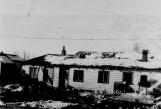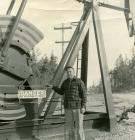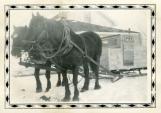14
The rapid changes in the community were overwhelming for the local citizens. Redwater was made up mainly of people who made their livelihood by tilling the soil. The newcomers quest and focus was far below the surface, and the fast pace would at times clash with the farmers' ideologies. The farmers were patient and content for the earth to yield forth their livelihood. The oilmen, on the other hand, were feverishly tearing through the layers of the earth to find the black gold hidden below. There were times when the two did not see eye to eye.Overall though, many of the local people benefited from the discovery of oil. The money garnered from leasing surface rights, selling land, and for many finding a job on the rigs made life so much better than it had been before. More wealth would have been gained, if the farmers had obtained the mineral rights to their homestead property. In 1905 the provincial government retained all mineral rights on the homestead properties. Very few homesteaders had the financial ability, forethought, or knowledge, to purchase the mineral rights.
While many did not gain great wealth there was jubilation over finding jobs with the oil companies and not having to leave Redwater. Mable Cook commented on her husband, Jud's employment with Imperial Esso.
"As soon as the well was capped, Judd was the first operator hired, and he moved us back to Redwater. We had to stay with his parents for a while until we could find a place of our own. We found a house, with half an acre of land half a mile south of the graveyard. The house was old and the floor was sunken but we propped it up and moved in anyways. We lived there for two years while the Imperial houses were being built. We drilled a well, but when the seismic crew set off a blast nearby the well went dry. It was frustrating to have done all that work and and end up with nothing. I also had a job during the oil boom as Jud volunteered me to do laundry for the oil workers. I was very lucky because I had a washing machine with a gas motor. The clothes were very oily and we had to haul water and heat it up for the washing. Then we bought an Imperial Oil house in Redwater for $3,500.00. "
15
Vic and Beanie Pasemko lived just southwest of Redwater on the home quarter. Vic commented on his experiences with the oil boom."In 1946 I took over the Imperial Bulk Agency but the profit was so poor I gave it up just before they struck oil. We could have been mighty rich if I had kept it as all the Imperial Oil contracted outfits including cars and trucks had to buy their gasoline there. I gave it up at just the wrong time as it turned out to be a very lucrative business.
"In 1947 and 1948 the seismic crews were out everywhere looking for oil. In the summer of 1948 the crew came in to drill the first well. The night the well came in I was out working in the field at the home quarter and when I saw that big plume of black smoke I knew something was up. You could see if for miles away.
"Before the boom the town had no power except a local generator. During the Boom Days, Calgary Power brought power to the town and then to the farms in 1952. After they struck oil the town got a lot of new businesses. At one time in the 1950's there were 4 service stations, 5 grocery stores, 2 lumber yards, 2 theatres and a bowling alley, yet the streets were not paved. Potholes and gravel was the norm and the streets weren't paved until sometime in the 1960's.
"Cafes to feed the working young men were any make shift building available. Soon Fall Suppers put on by churchwomen became pretty popular. One restaurant, Fred Kyle's Steakhouse was out at the Redwater highway corner. They served only very large steaks for $1.95 a plate and fed many hungry men.
"The small community Hall held dances to entertain the workers and their wives. The Oil companies held Christmas parties for the workers children complete with Santa Clause, gifts and lunches for all. A curling club was formed and when they had bonspiels men from Edmonton and the surrounding area would join together, ending up with a supper either in the church basements or the community hall.
"The crowding in Redwater, with the oil boom, didn't affect us very much but we did house men in our outbuildings up until 1952. With all the new people coming in carpenters were in great demand. They felt blessed with forty five cents an hour wages.
"A new comer, whether a passer-by or a visitor to the area, was struck by the unforgettable unpleasant smell, to the nose.
"At Kerinski, two miles south of Egremont a railway siding was used to transport the oil. They had large oil tanks to hold the oil and trucks would haul it here. It was then loaded onto trains and taken to the refinery at Edmonton. Imperial Pipeline purchased 50 acres of land from my father, Peter Pasemko. This land was along side the railway tracks and they used it to build a large tank farm.
"Two 100,000 barrel tanks and a 50,000 barrel tank were erected for oil storage. Interprovincial had their main offices here and Imperial Pipe Line also had a smaller office as well. There was also a maintenance garage for all the vehicles and a warehouse for oil well supplies. A bunkhouse was also put here for field and office workers. At first the oil was brought in by truck but later a pipeline was built to bring in the oil. Eventually "the oil was piped to the gas plant east of Redwater. From here they piped the byproducts such as propane and butane to Edmonton.
"I went to work for Imperial Pipeline at $1.00 per hour. I worked as a gauger on shift work. The nice part about this job was that I could just walk to work from the farm. I stayed at this job until 1969 when Imperial automated the field eliminating all the tank batteries and deliveries. Imperial offered me a job at either the gas plant or the fertilizer plant but I decided to work at the gas plant. I continued on at this job until 1981 when I retired. When I retired I missed the boys at work though."
17
Leo Brisson also found life long employment with the Ohio Oil Company. After serving overseas in World War II, Leo came back to Redwater and courted Dora Melnyk for a few years. They married November 15, 1945. They first tried their hand at running a restaurant at Lac La Biche but returned to Redwater. Leo started selling Raleigh products before working for the oil companies. Leo reminisced of his early exploits."When I sold Raleigh products. I would use my truck in the summer time and a horse and caboose in the winter. I had a large territory and had to travel all over the place. In the winter I would be away for a week at a time. One time when I had just left Redwater, the horses ran away with the caboose. All I could do was to hang on for dear life. The caboose tipped over and so did the stove. We banged along and would hit small trees and such. Finally the evener came loose and the horses came free to get away. It's a good thing I didn't pass out or I would have been burned in that caboose. I was pretty banged up.
"When the oil boom came I went to work for the British American Oil Company. I worked for seven months then they laid me off due to switching from three shifts to only one shift a day. It was very cold that first winter. The temperature never got above -45° Fahrenheit. I heard that the Ohio Oil Company was looking for operators so I wanted to see about getting on with them. They were working out by Amelia, along the Victoria Trail. I got my truck running but it took a long time to get warm enough to drive, when I did start out it was 2:00 o'clock in the afternoon and it was 45° below with a wind chill of around -65°. The tires on the truck were square because they were so cold. I went to the job and asked if they were hiring. I did get a job with them.
"This was the Ohio Oil Company's first venture out of the United States. When I was hired on I was hired as a foreign worker. Here I was in my own country and they called me a foreign worker. They had four wells out in the jack pines. Over the years the company was sold a few times and changed names, but they kept the four wells out there and I stayed with them.
"We moved to the jack pines. The company had a house there and we rented it for $15.00 a month. We raised our family there and it was a good place to live. When I was getting an award from the company, when I retired at age 65, the owner said he knew he had a good man when I came out to look for work when it was 60 below. I stayed on working with them as a contractor, until I was 70 and loved my work and time."
19
Imperial Esso Geological Department in Emile Royer's Chicken Coop in Redwater, AB.Circa 1949
Redwater, Alberta, Canada

20
Skid houses being erected to house the oil workers and families.Circa 1948
Redwater, Alberta, Canada

21
Imperial Esso realized the importance of the Redwater oil field and many Imperial Oil executives moved into the area. Finding suitable office space was not an easy task. Esso's first office was in a former chicken coop, owned by Emil Royer. The feathered friends were moved out and the Esso geological department moved in. The only answer to the office shortage was for Esso to build more office space. The company also realized that the housing shortage could only be alleviated if they undertook to build houses for the Imperial Esso staff.The company secured land on the northwest edge of Redwater and hired construction companies to build housing for the Esso families. This new housing development was known as the Imperial Esso town site. This new town site was named the Devonian Estates. Over the years the houses in that area have been referred to as "Esso" houses or the "Bird" houses, as one of the contractors hired was Bird Construction. However, now a days most people think this refers to the size of the houses, as they were very small by today's standards.
22
Redwater main street. Before the bowling alley and the Roxy theatre were built.Circa 1949
Redwater, Alberta, Canada
 Credits:
Credits:N. Woycenko and J.N. Woycenko
With permission from George and Edward Woycenko, sons of J. N. Woycenko
23
Development was moving at a very quick pace. On September 26, 1950 it was reported that 635 oil wells were now active in Redwater. Just a short time later, on October 10, 1950 that number had grown to 665 oil wells operating. Even the Town of Redwater was not off limits in the insatiable quest for oil. Rigs soon invaded the community and oil wells were drilled in all corners of Redwater. All over town producing wells sprang up and rigs could be seen everywhere. Mable Cook, commented on the impact this had on the community and so eloquently captured the essense of the oil boom."There were oil wells everywhere, when you went out at night the sky was lit up with flares from all the oil derricks; there was even an oil derrick in the schoolyard! I could count 6 derricks just standing outside my door in every direction. It was exciting but scary. It was great for the people selling land and making profit and progress."

